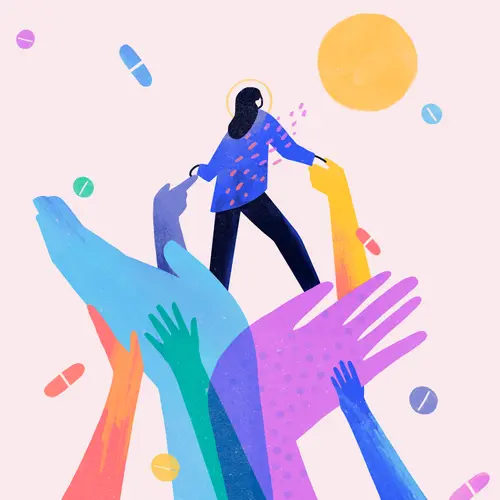Hot flashes. Sleepless nights. Weight gain. Pain during sex. Although the symptoms of menopause don’t change from generation to generation, treatment does. Today’s care is made for all of you -- body and mind.
“Research in the last 5 years has changed our approach. The focus used to be on counting hot flashes, but doctors realized that we needed to look at this more holistically and in terms of quality of life,” says Janet Pregler, MD, director of the Iris Cantor-UCLA Women’s Health Center.
Pregler says a type of mental health counseling called cognitive behavioral therapy can help women with troublesome hot flashes who couldn’t take hormone therapy because they had breast cancer. Six weeks of counseling improved the women’s mood, sleep, and general sense of well-being, even though the number of hot flashes didn’t change.
“Treating menopause isn’t just about treating symptoms. It’s about how you think about menopause and react to those symptoms,” Pregler says.
Lifestyle Changes
Working out can help a lot, says Becky Lynn, MD, assistant professor of obstetrics and gynecology at St. Louis University. “There are so many reasons to exercise -- healthy weight, mood swings, better sleep. Go for aerobic exercise that gets your heart rate up.”
Losing weight can also help. “Back in the '80s and '90s, it was thought that being at a higher weight protected you from hot flashes. Now we know it’s the opposite,” Pregler says. Women with extra pounds have more issues with that symptom, she says.
Some tricks your mother might've used still work, though. For hot flashes you can:
- Dress in layers.
- Keep a fan with you.
- Eat ice pops or sip cold drinks.
Eating right becomes more important at this stage of life, says Christine Soutendijk, MD, clinical assistant professor at the Sidney Kimmel Medical College at Thomas Jefferson University. “You have to pay a lot more attention to what you put into your body and how you take care of it than you did before. Are you balancing fruits, vegetables, and protein? Are you drinking enough water?”
Sleep problems can be tricky, because they can make other symptoms of menopause worse, like trouble staying focused. Try these tips if you have a hard time dozing off:
- Get out of bed and go into another room.
- Do something quiet that doesn’t require a lot of thinking.
- Skip caffeine after noon.
- Pass on alcohol in the evening.
- Don’t take afternoon naps, even if you’re tired.
- Stay away from phone or computer screens.
- Ask your doctor about the supplement melatonin.
- Use sheets that wick, or pull, moisture away from your skin.
- Use a cooling pad or pillow.
Help for Painful Sex
After menopause, the inside of your vagina can get dry. That takes the fun out of sex. A personal lubricant can help, but you have to pick the right one.
“Water-based lubricants are a necessity if you use condoms, but women often tell me the water-based ones dry up quickly and are sticky,” Lynn says. "Try a silicone-based lubricant instead.”
Daily vaginal moisturizers can help, even if you’re not having sex, Pregler says. “Think of it the way you think of moisturizing your skin. You use lotion every day, not just when you’re gardening.”
Your vagina can get shorter, thinner, and less elastic after menopause. Generations ago, women might have considered that to be the end of their sex lives, but now doctors know that it’s “use it or lose it.”
Have sex or use toys like vibrators inside your vagina to keep it in shape. If the changes have been severe or it’s been a long time since you got busy, your doctor may advise you to use vaginal dilators, gadgets that gradually stretch things out.
You might also try physical therapy if sex is painful for you. If you tense up because you’re afraid of pain, your body learns to do that when you have sex. “The physical therapist can teach you how to relax your muscles,” Lynn says.
Medication Can Help
Hormone therapy is still the main menopause treatment, but the finer points have changed, Soutendijk says. “We’re using far lower doses than we used to. The goal is to take just enough to help relieve hot flashes and no more.”
If you’d rather not take pills that affect your whole body but still need something to help with dryness and tone, your doctor may prescribe suppositories or a ring, cream, or gel that you put inside your vagina.
“These don’t help hot flashes, but the advantage is that very little estrogen gets absorbed into the body, so they don’t have the same risks for breast cancer and blood clots as [traditional hormone therapy],” Lynn says.
Non-hormonal treatments are making their way onto the market. The FDA has approved the antidepressant paroxetine (Brisdelle, Pexeva, Paxil) for hot flashes. Another medication called ospemifene (Osphena) can help make sex less painful. It works like estrogen to make your vaginal walls thicker and less fragile.
The jury is still out on herbal supplements, like soy, red clover, and black cohosh, Soutendijk says. The studies aren’t that great, and the ones we do have show that soy and other supplements aren’t any better than placebos.

